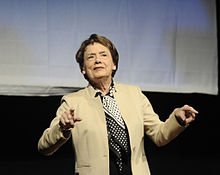Multilateral Agreement on Investment
When its draft became public in 1997, it drew widespread criticism from civil society groups and developing countries, particularly over the possibility that the agreement would make it difficult to regulate foreign investors.
After an intense global campaign was waged against the MAI by the treaty's critics, the host nation France announced in October 1998 that it would not support the agreement, effectively preventing its adoption due to the OECD's consensus procedures.
[3] Attempts to establish a framework for the protection of foreign investments dates back to the 1920s, most notably negotiating a League of Nations draft convention.
[6] In 1965, the International Centre for Settlement of Investment Disputes (ICSID) was established in the framework of the United Nations, and in 1967, the OECD prepared the Draft Convention on the Protection of Foreign Property although this was not adopted.
The chairperson of the negotiating group was Frans Engering (Netherlands) and vice-chairpersons were Al Larson (United States) and A. Saiki (Japan).
MAI opponents made heavy use of electronic mail and the World Wide Web in raising the alert, sharing information and coordinating actions.
"[18] According to Theodore H. Cohn in Global Political Economy Theory and Practice (2005), "[t]he most effective opposition to the MAI was launched by a wide-ranging coalition of civil society NGOs.
From the document, Mr. Khor understood that multilateral investment negotiations, which his organisation as part of a large coalition opposed at the WTO, might be ongoing at the OECD.
Building on the credibility of her status as a lawyer, she transformed the legal OECD documents into accessible wording, often "ready for use" in the subsequent NGO campaigns.
She would launch the campaign under the name of the "Dracula Strategy" implying that simply exposing the MAI project to the light would be sufficient to kill it (sourced to an interview with Susan George).
[23][24] The MAI prompted criticism that it appeared to establish a new body of universal investment laws to guarantee corporations excessive powers to buy, sell and undertake financial operations all over the world, severely diluting national laws, e.g., on environmental protection, regulation of labour standards and human rights established in developed countries.
By their arguments, the draft proposed a North American Free Trade Agreement-style investor-state dispute settlement tribunal in which corporations could sue governments if legislation (e.g., for national health, labor or environment), threatened their interests or were considered to expropriate actual or potential assets and/or profits.
[23][24][25] Mark Vallianatos, of Friends of the Earth, argued that: Contributors to the MAI-NOT newsgroup, including Maude Barlow, mounted a campaign[27][28] with the active backing of the Council of Canadians which had earlier opposed the 1994 North American Free Trade Agreement (NAFTA) between the USA, Canada and Mexico.
The presence of one key MAI player, Donald Johnston (General Secretary of the OECD) at the conference helped to focus the action, one of the three most important anti-MAI events in the world.
[30] A strong campaign was led by Lori Wallach of Public Citizen's Global Trade Watch, and a coordinated network ("50 Years is Enough') including Friends of the Earth, the Alliance for Democracy, Witness for Peace, the Sierra Club, the Preamble Center, the Democratic Socialists of America and other groups.
However, Australian activists, including supporters of Pauline Hanson,[32] were already studying the leaked MAI draft and corresponding with the Canadian email discussion group MAI-NOT while deciding how to organise a national campaign to link with those of other countries.
[33] In November 1998, prior to the opening of OECD negotiations in Paris, the coalition delivered to the meeting's chairman and to the Australian prime minister a protest letter endorsed by over 500 organisations and individuals.
After receiving this report, prime minister Lionel Jospin addressed the Assemblée Nationale on 10 October 1998 and announced his decision to withdraw.
"[18] France was followed by a succession of other nations including Canada and Australia whose governments had been under relentless pressure from civil society to abandon or radically revamp the MAI.
[38] A senior treasury officer, cited in a 1999 Australian parliamentary report, stated that "any future work on the matter known as the MAI needed to address the OECD Ministers' requirement to protect the sovereign right to regulate and to ensure citizens were not harmed by efforts to liberalise foreign investment.
[41] At the WTO Ministerial in Cancún, Mexico, in September 2003, a group of more than twenty developing countries united to block the inclusion of the Singapore issues, including investments, in the Doha Round of trade talks.
